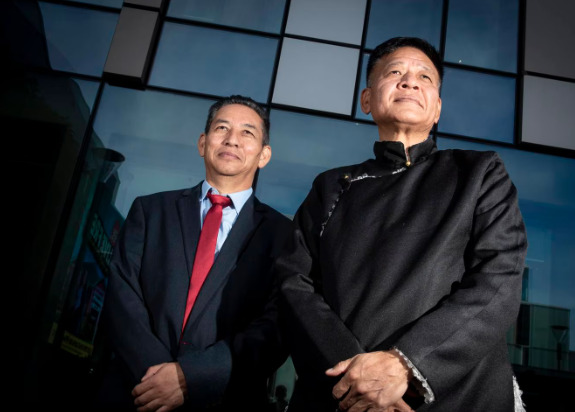Lincoln Tan for Nzherald.co.nz
The head of Tibet’s government in exile says he wants New Zealand’s Prime Minister to raise the issue of autonomy during Chris Hipkins’ visit to China.
Penpa Tsering, known as the Sikyong of the exiled Central Tibetan Administration, arrived in New Zealand last night for a three-day visit to meet members of the Tibetan community, Tibetan supporters, and MPs.
“The situation in Tibet is very grim,” Tsering said.
“Our culture is being destroyed. The very identity of the Tibetan people is being destroyed. There is no political space whatsoever and there is no religious freedom.”
Hipkins will visit China amid concerns about foreign interference here. It will be the first visit by a New Zealand leader to China since 2019.
Tsering said: “We are committed to the middle-way policy as proposed by his holiness the Dalai Lama, and if China has common sense and New Zealand as a friend should advise that Tibetans are not seeking independence but autonomy,” he said.
“That is for the betterment of China, as well as the international community.”
Hipkins has not been able to confirm if he had secured a meeting with Chinese President Xi Jinping.
Tibetan leaders in exile have accused China of cruel policies in Tibet that separate families, ban their language, and enforce non-consensual DNA collection.
“Now the Chinese have started what is called this colonial-style boarding schools aimed at the eradication of Tibetan language, culture, religion and everything,” Tsering said.
“That’s why I say culturally, we are dying a slow death.”
Beijing, meanwhile, has accused the Dalai Lama, Tibet’s 87-year-old spiritual leader, of separatism in Tibet.
The Chinese Communist Party also does not recognise the Tibetan government in exile, which represents about 100,000 exiled Tibetans living in 30 countries including India, Nepal, the US and New Zealand.
Tsering, who is based in India, said concerns are growing about China’s military expansion, pressure on Taiwan, democracy crackdowns in Hong Kong and against Uyghurs in the Xinjiang region.
On his first visit to New Zealand, Tsering said he was here to understand how responsive the New Zealand Government and leadership were to the plight of people suffering around the world, including Tibet.
“Particularly now when China is a more assertive, hegemonic, authoritarian power in the whole region,” Tsering said.
“They don’t want the involvement of the Western world in this part of the world where they fear that there could be a Nato-like formation in the region and then they will not be able to use their cohesive politics in this region.”
Tsering’s view was that New Zealand needed to be“very, very strategic in its approach” when dealing with China.
New Zealand’s diplomatic and trade mission to China also comes as the Chinese embassy in New Zealand slammed a joint declaration New Zealand signed against “economic coercion”.
Economic coercion is the practice of trying to influence countries by threatening to hit them with trade or economic sanctions if they do not comply. China is alleged to have used economic coercion against the likes of Lithuania and even Australia.
NZ exports to China increased to more than $21 billion in the year to last December – accounting for a quarter of New Zealand’s total exports.


